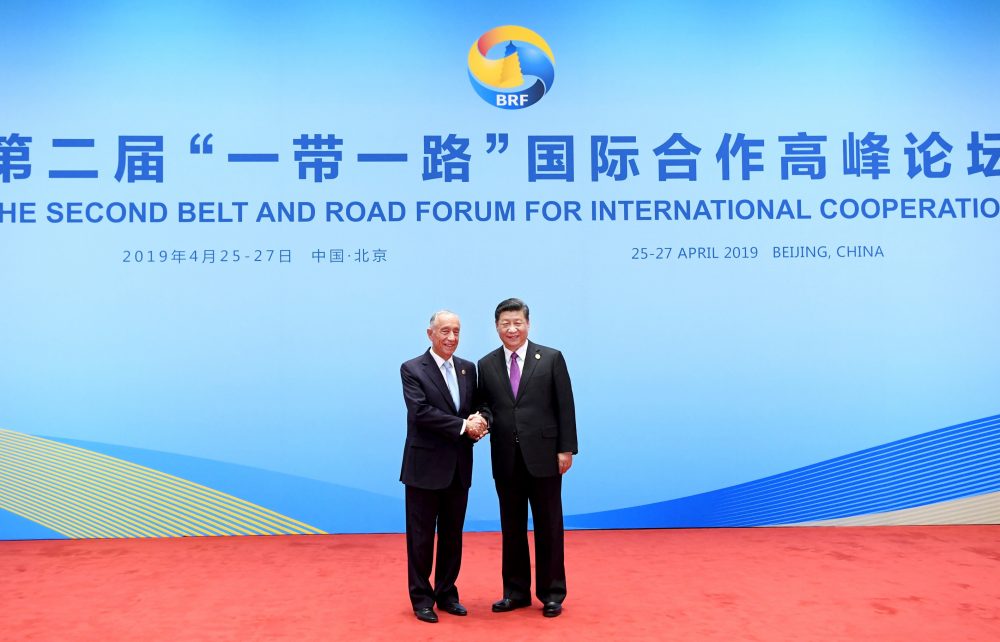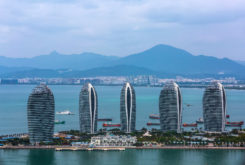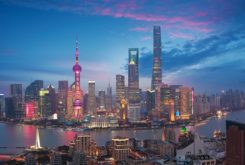Last week, Portugal was widely expected to be the highlighted country at the 2nd Belt and Road Forum held in Beijing, but instead it was Mozambique and Equatorial Guinea that took center stage.
In the run-up to the Forum, from the 25-27 of April in Beijing, expectations were high among the Portuguese business and academic community, especially given that the event was to be attended by the president himself, Marcelo Rebelo de Sousa, who hosted Chinese president Xi Jinping in Portugal in December 2018.
During Xi Jinping’s visit to Lisbon, Portugal’s participation in the BRI was inked on the Memorandum of Understanding (MoU) on cooperation within the framework of the Belt and Road strategy. The document is already in force, for five years. Its validity will be extended for further 5-year periods unless terminated by one of the parties. Spain shied away from signing a similar MoU and Portugal emerged as China’s key partner in Europe.
In the document, Portugal and China support synergies between the initiatives and “priorities defined in the investment plan for Europe and the EU Strategy on connecting Europe and Asia, including the Trans-European Networks, and welcomes the outcomes of the discussion in the EU-China Connectivity Platform”. This comes as an assurance to Portugal’s European partners on harmonious articulation between China and the EU’s projects.
But in April in Beijing, even though the Portuguese president is a political “superstar” in his home country and travels with a vast media pool, Portugal’s presence at the Forum was relatively low key.
Other than the fact that the president’s delegation lacked political and economic weight, Marcelo Rebelo de Sousa did not attend the opening of the Forum. Speaking at one of the Summit’s working session – on “Promoting environmentally friendly and sustainable development to implement the UN 2030 Agenda” – Rebelo de Sousa spoke of human rights and climate issues.
Sources linked to Chinese affairs in Lisbon consider Rebelo de Sousa’s presence, as well as the governments’, a “missed opportunity” to materialise the MoU signed in December.
“Compared to other countries, Portugal was nowhere to be seen at the Beijing Forum,” said another source.
From the discrete presence at the Forum, Rebelo de Sousa went on to an official visit in China, which included Beijing, Shanghai, Hong Kong and Macao.
Rebelo de Sousa organised a dinner with the presidents of some of the largest Chinese companies with investments in various sectors in Portugal at the residence of the Portuguese Ambassador in Beijing.
The dinner included Lei Mingshan, of the China Three Gorges Corporation, Wang Qunbin, of Fosun International Limited, Xing Baoan, of the State Grid Corporation of China, Qu Qiuping, of the Haitong International Securities Group, Li Yongcheng, of Beijing Enterprises Water Group, Pansy Ho, of STDM Investimentos Imobiliários/Estoril Sol, Patrick Yu, of COFCO, Liu Liange, of the Bank of China, Guo Chuntai, of Tianjin EV Energies Co., Guan Qing, of CSCEC China State Construction Engineering Corporation, among others.
At the Summit, it was Italy that was feted as the one in the continent to take the lead on the Belt and Road strategy, even though its MoU with China was signed after Portugal’s. Italy has already signed 29 economic agreements, valued at a total 2.5 billion euros, including in Agriculture, Finance, Energy, with Italian engineering companies gaining access to the vast Chinese market.
In private, some sources question the Portuguese government’s choice of centralising the Belt and Road strategy, largely ignoring civil society institutions, namely companies and academia.
The fear is also growing that the Chinese may lose interest in the Port of Sines, which is key in the BRI. With an already strong Chinese presence at the port of Piraeus (Greece) and an increased interest in the port of Trieste (Italy), Sines may be shifted to non-priority status, according to the same sources.
At the Summit, Xi Jinping underlined that cooperation agreements must be of high quality and meet international standards, as well as have economic viability. The Chinese president also stressed the need for projects to be corruption-free and environmentally friendly, new priorities for China abroad.
With growing criticism, especially by the US, of indebtedness in developing countries related to Chinese infrastructure projects, Yi Gang, Bank of China president, assured China will build a market-oriented financing system, with debt sustainability evaluations taken into consideration.
The final document also states that the government of China has signed cooperation and action plans with Mozambique, the African Union and UN agencies.
Speaking to the press at the end of the Forum, Chinese President Xi Jinping said this years’ message was clear: “an increasing number of friends and partners will join in with the Belt and Road cooperation.”
On the eve of the 24 April, Xi Jinping met with the President of Mozambique, Filipe Jacinto Nyusi, in the Great Hall of the People. Mozambique, according to an official statement, is an “important site on the ancient Maritime Silk Road and has actively participated in the construction of the Belt and Road initiative in recent years.” Both sides reached an agreement on joint promotion of the initiative.
Nyusi said that Mozambique “is willing to play an active role in the joint construction of the Belt and Road initiative in the African sub-region,” the same source said.
Among the Community of Portuguese-Speaking Countries (CPLP) members, perhaps the biggest surprise was Equatorial Guinea, that signed a Belt and Road Initiative MoU in Beijing.




